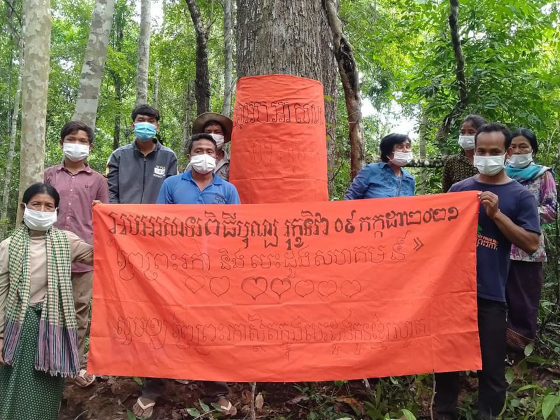
Savorn (right) and other community members celebrate National Tree Day in 2021.

Indigenous rights activist (Prame commune), Preah Vihear province
The Kuy are one of an estimated 24 indigenous groups in Cambodia. Indigenous peoples’ rights are afforded special protection under Cambodian and international law, as they are especially vulnerable to land conflicts given that their cultures, livelihoods, and spiritualities are inextricably linked to their traditional lands and resources. After witnessing countless land rights violations against his Kuy community in Prame commune, Sut Savorn became involved in indigenous rights activism.
We love the forest. We want to protect it. We want it to be sustainable. The forest does not belong to any one person; it belongs to everyone.
Savorn’s community – in addition to neighbouring others – have been embroiled in long-standing disputes with companies that have received Economic Land Concessions (ELCs) from the government. These ELCs – and other forms of state-sponsored land occupation – enable companies to develop land for agro-industrial development at the expense of the indigenous groups that live there. Companies such as Lan Feng (Cambodia) International and Hengfu Group Sugar Industry have proceeded to encroach upon, plough, and clear community land over the years. This land-grabbing has adversely affected indigenous communities’ homes, livelihoods, and sense of cultural security.
“We only fight for justice in accordance with the law,” says Savorn. “What we have done is lawful, but they accuse or harass us because we are human rights defenders.” The most notable form of harassment that Savorn and his community suffer is through the courts: private companies and individuals have brought numerous complaints against members of the Kuy community for asserting their legal rights over their traditional lands. Savorn reports that such harassment is constant, and a common way for authorities to exert pressure.
Savorn offers one stark example from around 2017, when eight community members were accused of illegally detaining a representative linked to a sugar company. This was the result of an event that happened around three years prior: between 200 to 300 villagers had confiscated a company bulldozer that was ploughing indigenous land. It was only around 2017 – that is, when the community voluntarily sought to return the equipment to its owner – that charges were brought. After another protracted process, the charges were dropped in early 2023.
Sut Savorn speaks from his home in Preah Vihear.
Savorn also explains how authorities obstruct the Kuy community’s land patrols. “Environmental officials want us to register as a Community Protected Area and receive recognition from the Ministry of Environment.” Savorn states that his community does not wish to be registered; rather, they prefer to mobilise locally as and when necessary, to ensure more effective protection of the forest as a whole. Savorn’s reverence for Cambodia’s forests is apparent: “We love the forest. We want to protect it. We want it to be sustainable. The forest does not belong to any one person; it belongs to everyone.”
This land-grabbing has adversely affected indigenous communities’ homes, livelihoods, and sense of cultural security.
The fight for indigenous rights is time-consuming. “Some community members continue their journey, but some stop because they have been fighting for a long time, and their livelihoods worsen as a result.” Savorn’s activism leaves him little time for paid work and his devotion to community work has forced him into debt, simply to cover basic family expenditures. Despite this obstacle, he persists: “If we abandon the protection of human rights and the environment, the next generation will realise that we did not struggle, that we did not demand anything, and that we allowed powerful people to abuse our rights. If we are unwilling to spend time on society, we have no value.”
So far, no community members from Savorn’s Kuy indigenous community in Prame commune have been imprisoned for their activism. While this possibility remains a concern for Savorn, he is buoyed by his family, friends, and fellow human rights defenders: “I always have my community to help. For as long as my work is legal, I don’t worry about it too much.” Savorn is confident in the solidarity of his community: “When I testify at court, around 200 to 300 people will come to support me.”

Savorn (right) and other community members celebrate National Tree Day in 2021.
This unity gives Savorn comfort. His network is not limited to the Kuy, either – Savorn explains how nearby members of the Bunong and Jarai indigenous groups collaborate to protect and defend each other’s rights.
“The only people with solutions are ourselves. If we’re not doing it, who will?”